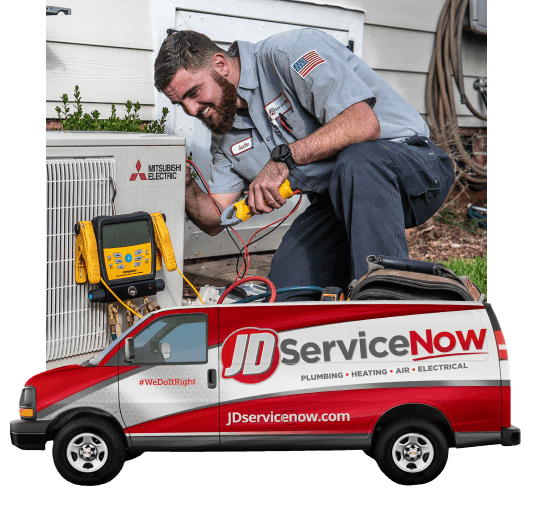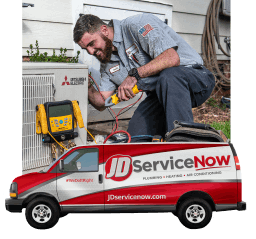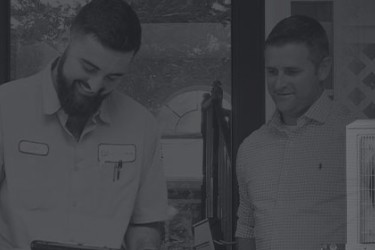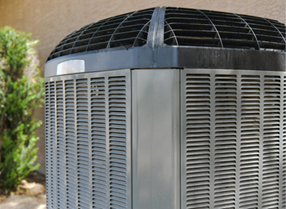Preventing Sewer Line Damage Caused by Tree Roots
Did you know that tree roots may actually grow toward sewer lines, looking for water, nutrients, and oxygen? If they find a crack, they’ll creep inside and continue to grow, where they can cause serious damage. And the worst part is that you’ll have no idea until something goes wrong.
If you have trees growing on your property, you can prevent them from damaging your sewer lines by:
- Finding out where sewer lines are located before doing any planting/landscaping.
- Creating a barrier between tree roots and sewer lines.
- Planting trees and shrubs a safe distance away.
- Having sewer lines inspected regularly.
Looking for more information or for help because tree roots have damaged your sewer lines? Call JD Service Now at 919-383-7000. We serve Durham, Apex, Chapel Hill, Raleigh, Cary, and the surrounding areas.
3 Steps to Prevent Tree Roots from Damaging Sewer Lines
You want trees on your property, but you don’t want them to damage sewer lines, which could cause thousands of dollars in damage and lead to unsanitary, unsafe conditions on your property.
There are a few steps you can take to protect your sewer lines:
- Find out where sewer lines are located before doing any planting/landscaping. This is a step you can take even after trees or other landscaping have been planted, to see where lines are located and to determine if they’re at risk. As a homeowner, you can contact your local public works department, or you can call 811 from anywhere in the U.S. and you’ll be routed to your local call center. You can even visit www.nc811.org. It’s recommended that you call or put in an online request at least three days before you want to start digging.
- Create a barrier between tree roots and sewer lines. Whether you’re planting now or already have trees on your property, an underground barrier can be put in to protect your pipes. Chemicals that prohibit growth, such as potassium hydroxide or copper sulfate, can be spread near the sewer line to prevent roots from growing too close to the pipes. You can also bury metal or wood barriers alongside sewer lines to stop roots from reaching them.
- Plant trees and shrubs a safe distance away. When you know where your sewer lines are, make sure any trees or plants are placed far enough away that they will pose less of a risk. If you want to plant a tree or shrub closer to a sewer line, consider putting in a barrier or choose a plant with a smaller root ball that will not grow as quickly.
- Have your sewer lines inspected regularly. Routine maintenance can help you avoid major sewer line repairs by clearing the lines and preventing root growth inside. It can also reveal any issues before they’re serious problems, saving you from facing expensive repairs.
What If My Sewer Lines Are Already Damaged?
If you’ve noticed any signs that may indicate that tree roots have already affected your sewer lines, call a professional as quickly as possible. Frequent clogs, overflowing, and slow draining may all be signs of an issue with your sewer lines. A plumber can come out and do an inspection to see if tree roots are the problem. Depending on the extent of damage, the lines may need to be repaired or replaced.
For more information on sewer line repairs, maintenance, and installation, give our Durham plumbers a call at 919-383-7000. You can count on us for experienced, reliable service.
Recent Posts
Finance Now & Get Approved Today!
Don’t Sacrifice Your
Family’s Comfort!
FIND Out MORE
Family’s Comfort!
Recent Posts
Request Service
Get the fast, affordable HVAC, plumbing, or electrical services you deserve by filling
out the form below.
Request Service
Sign up for the Always Right
Home Partnership Program
Our 100% Worry-Free Home Service Plans
Experience unmatched peace of mind when you invest in our Home Partnership Program. From priority service, seven days a week, to 10% off all service and repairs, when you become a member of our home service plan, you can rest assured that our reliable team will keep your home’s comfort systems operating smoothly. Learn more about the HVAC, plumbing, and electrical benefits you’ll get when you sign up!
LEARN MORE






